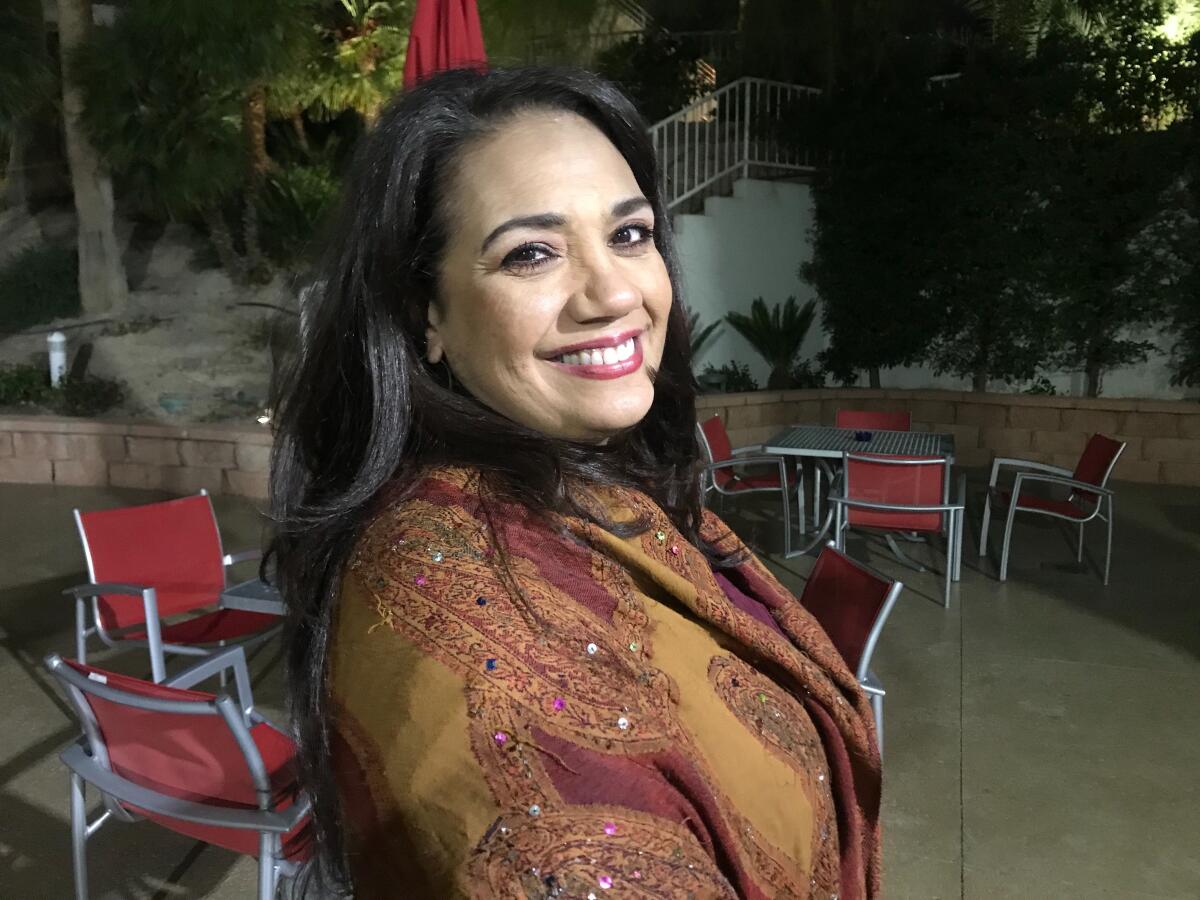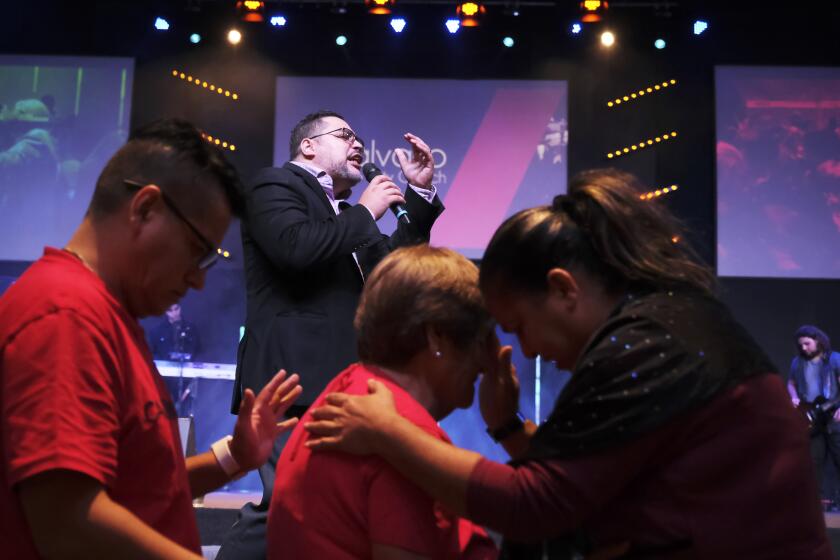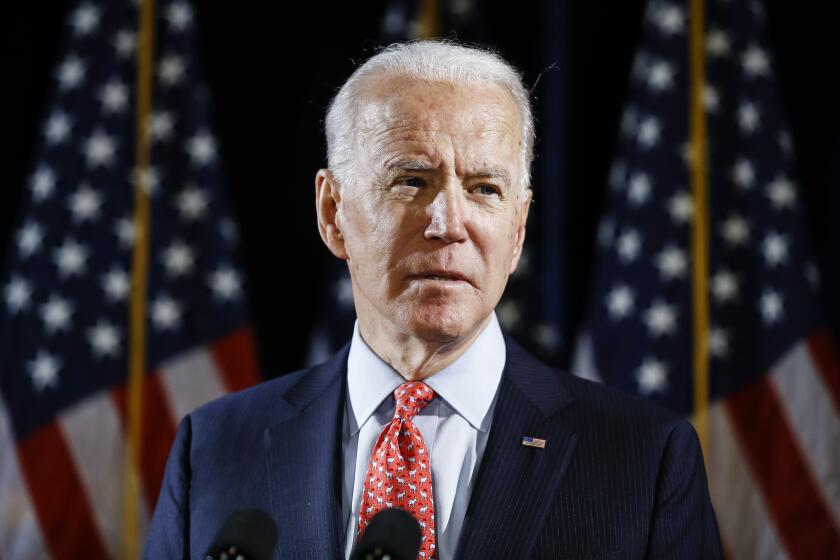Nevada’s coveted Latino voters have Democrats racing around the state
- Share via
LAS VEGAS — Lisa Rosario is, right now, one of the most coveted voters in the nation.
Weighing her choices in Saturday’s Nevada caucuses, the 55-year-old describes this presidential election as hugely consequential. “This is like women’s rights or ending slavery,” said Rosario, who is deciding between Joe Biden and Amy Klobuchar. “It’s that important.”
For the record:
12:57 p.m. Feb. 18, 2020An earlier version of this article identified Cecia Alvarado as executive director of Mi Familia Vota in Nevada. She is the Nevada state director for the organization.
Voters like Rosario, a self-described political junkie of Puerto Rican descent, promise to significantly reshape the Democratic race.
After balloting in Iowa and New Hampshire, where the electorates are overwhelmingly white, the contest in Nevada presents candidates with their first real test among voters of color, who make up the base of the Democratic Party. Four years ago, Latino, black and Asian Americans made up more than a third of Nevada caucusgoers.
“We’ve got the most diverse group here,” Gov. Steve Sisolak said before candidates spoke over the weekend at a big Democratic fundraising bash in Las Vegas. “This is the United States of America that you’re seeing represented in this room tonight.... That’s who these candidates have to appeal to, across all demographics, across all other issues. They have to appeal to everyone.”

Cecia Alvarado, state director of the nonpartisan organization Mi Familia Vota in Nevada, said campaigns have been more active in courting Latino support than ever, and not just by sprinkling in a word or two of Spanish.
“They know that Latinos are looking for them to talk about the issues that they care about,” Alvarado said. “The Latinx voter is a high-maintenance voter. It’s no longer just enough to run an ad in Spanish.”
Most campaigns have made a point of hiring bilingual Latino staff, including in leadership positions. They send mailers in multiple languages and dispatch multilingual volunteers to court voters by phone and in person.
Wednesday’s Democratic presidential debate will feature billionaire Michael Bloomberg for the first time. He can expect attacks from his primary rivals.
Advertising is, of course, ubiquitous, with candidates spending a total of $15.1 million to date in Nevada on both Spanish- and English-language television, according to an analysis by the website FiveThirtyEight.
Viewers watching Telemundo on Sunday may have caught an ad for Minnesota Sen. Klobuchar featuring a Spanish-speaking narrator who spoke about her fight for better healthcare, prescription drug prices and education. “Amy knows what’s important: our well-being,” the narrator says.
Vermont Sen. Bernie Sanders’ ad, which also features a Spanish-speaking narrator, is more personal, reminding viewers that his father immigrated to the U.S. seeking a better life and didn’t speak English. “Bernie never forgot the immigrant roots of his family, and that’s why he has always fought for us,” the narrator says.
Massachusetts Sen. Elizabeth Warren’s Spanish-language ad also strikes a personal tone, saying that she fights hard because she comes from a family that struggled.
Billionaire activist Tom Steyer, who is responsible for more than two-thirds of the candidates’ ad spending in the state, is on TV so frequently that Cindy Gonzalez can recite by memory his ads about President Trump’s immigration policies.
A 27-year-old engineer from suburban Henderson, Gonzalez voted for Warren, and wishes her candidate would be on television more frequently.
“She has a plan for healthcare, and it’s great, but people just don’t know about it,” Gonzalez said after hearing Warren speak at an early-voting event at a Las Vegas high school auditorium.
‘Because we’re evangelical, people assume we’re Republican, and because we’re Latino, people assume we’re Democrats,’ says the pastor of a Pentecostal church in Florida.
Her co-worker Dylan Jaramillo, who also voted for Warren, agreed. “I believe she is the candidate to beat President Trump,” he said, but he added that he hadn’t seen any of her Spanish-language advertising. “She’s done a pretty poor job at targeting, especially the Hispanic community.”
Former South Bend, Ind., Mayor Pete Buttigieg is the sole remaining candidate in the race who speaks Spanish, which he does in his TV advertising and stumping across the state.
At a Las Vegas rally, Buttigieg switched from English to Spanish as he addressed immigrants residing in the U.S. after being brought unlawfully as children. “Y a los soñadores que están aquí, les apoyamos y sabemos que este país es tu país también,” he said, which translates to: “And to the Dreamers who are here, we support you, and we know that this country is your country, too.”
The line struck Marci Pichardo as odd.
“It just sounds weird to hear a politician try to force it because they don’t really speak the language,” said Pichardo, a Latina who decided to support Sanders. “I get they’re trying to get voters, but it just sounds kind of fake.”
The field is down to Joe Biden now that Bernie Sanders ended his presidential campaign. Here is the Democrat heading for a battle with President Trump.
During the question-and-answer portion of the event, Buttigieg was asked a written question in Spanish about the immigrant experience for Latinos. His response came out in choppy Spanish as he appeared to grasp for words. It prompted brief clapping from the mostly white crowd and a short “Si se puede!” chant before he translated his response into English.
Efforts to court voters through Spanish-language media can be similarly perilous, as Klobuchar and Steyer learned last week. Asked on Telemundo to name Mexico’s president, both failed. Only Buttigieg was able to identify Andrés Manuel López Obrador.
Many candidates are leaning heavily on surrogates to make their case.
Julián Castro, the Texan and former Obama Cabinet member who dropped out of the presidential race in January, will stump for Warren this week. Steyer had the son of one of the members of the band Los Tigres del Norte speak out for him. Former Vice President Biden tapped Los Angeles Mayor Eric Garcetti, who is of Mexican, Italian and Jewish heritage, to speak on his behalf at an event in Las Vegas featuring Latino leaders, where the campaign handed out “Estoy con Joe” stickers.
“En español, decimos, dime con quién andas y te diré quién eres,” Garcetti told scores of volunteers and supporters. “It’s a dicho — saying — that says, ‘Tell me who you walk with and I will tell you who you are.’”
Campaigns have also held social events intended to foster bonds and familiarity in the community.
Sanders’ campaign recently hosted a house party with supporters over tamales and put together a soccer game Monday night with voters. Steyer’s organization allowed community members to stage a Christmas play at one of its offices.
No one has as much at stake as Sanders, a front-runner here who invested in Latino outreach efforts early and aggressively, and who is counting on Latino support as critical to his path to the nomination. He’s taking a similar approach in California, where he rallied thousands in the Bay Area on Monday. Polling shows he is popular with Latinos, particularly young people.
Jessica Ramos, a state senator from New York, encouraged Sanders’ supporters during a weekend rally on Las Vegas’ east side to make sure they turn out.
“Nevada, we need you to caucus, we need you to vote for Bernie, we need you to bring your abuela, we need you to bring your tío, we need you to bring your best friend, we need you to bring your neighbor,” she told more than 1,000 people gathered at a high school in the heavily Latino part of the city.
Sanders then led a march to a nearby early voting site, followed by several hundred chanting supporters.
Sierra Brooks, a Las Vegas resident of Mexican and African American descent, was among those casting her first-ever ballot.
“I like how he’s going to give everybody an opportunity to have healthcare and he’s going to give everybody an opportunity to go to school,” the 19-year-old call-center worker said of two of Sanders’ campaign promises. “I’m excited.”
California’s primary election is March 3, 2020. Here’s what you need to know about the presidential candidates and voting on Super Tuesday.
More to Read
Get the L.A. Times Politics newsletter
Deeply reported insights into legislation, politics and policy from Sacramento, Washington and beyond. In your inbox three times per week.
You may occasionally receive promotional content from the Los Angeles Times.















